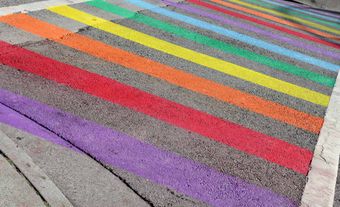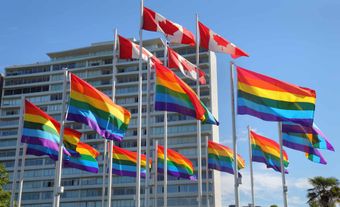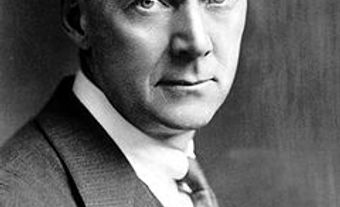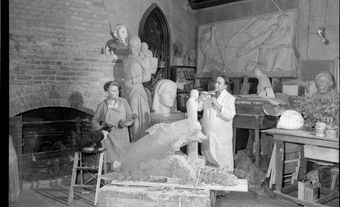Elsa Alice Gidlow, poet, journalist, philosopher, humanitarian (born 29 December 1898 in Hull, United Kingdom; died 8 June 1986 in Mill Valley, California). Elsa Gidlow was a key LGBTQ2 figure in the first half of the 20th century. She co-published Les Mouches fantastiques (1918–20), the first queer magazine in North America. She also wrote what is believed to be the first collection of openly lesbian love poetry published in North America: On A Grey Thread (1923). Her 1986 autobiography was the first memoir by an openly lesbian writer. She was also a co-founder of Druid Heights, a utopian community outside of San Francisco.
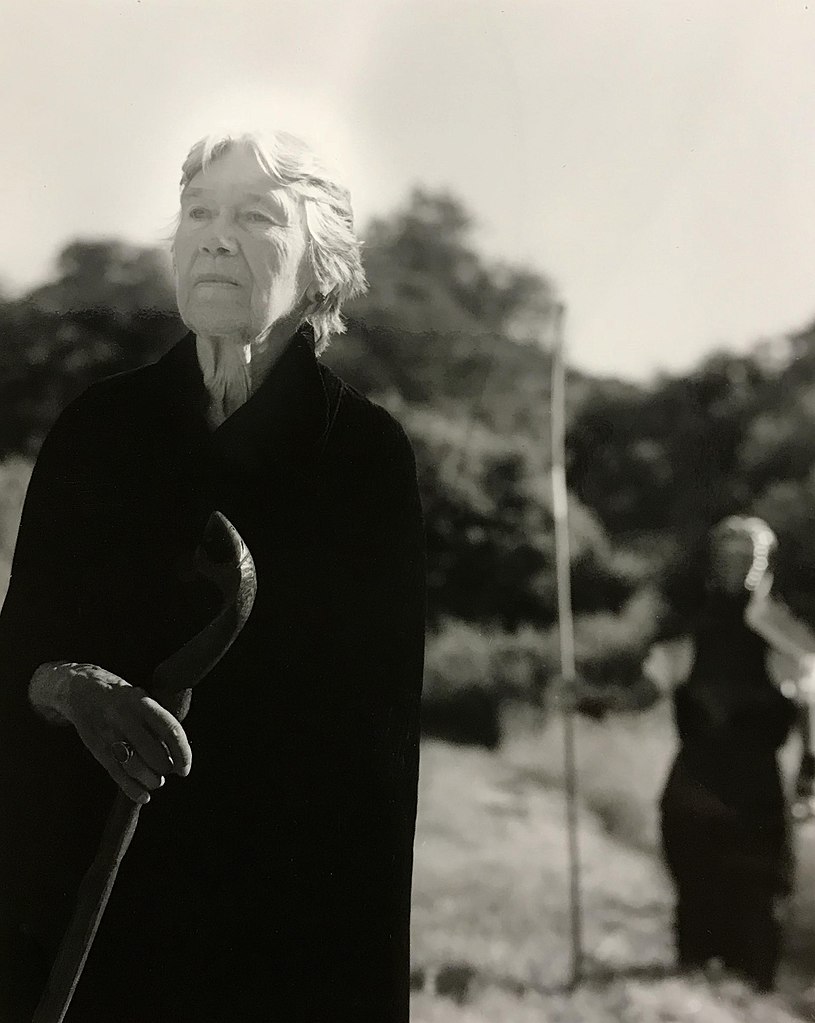
Childhood and Family
Elsa (possibly Elsie) Gidlow was born in Hull, Yorkshire, England in 1898, the eldest of seven children. Her father, Samuel A. Gidlow, was a railway clerk. Her mother, Alice Reichardt, left behind her loving and large family when Samuel found work in Canada. Her father gambled away the family’s savings, hoping to win enough for a passage to New Zealand. When this did not occur, he found work as a clerk with the Canadian Pacific Railway and immigrated to Canada in 1904.
Elsa and her mother and siblings followed in 1905, arriving in Montreal on Dominion Day of that year. The family rented a small home before moving in with another family, sharing their small apartment. Eight children and four adults shared a single room, kitchen and toilet.
Elsa’s family later moved into an unfinished house in the east end Montreal suburb of Tétraultville (now part of Mercier-Hochelaga-Maisonneuve). They were reportedly the only English-speaking and Protestant family in the predominantly French-speaking and Catholic suburb.
In her youth, Elsa had a voracious appetite for books. She also realized at a young age that her sexuality set her apart from others. She knew that she would not fit in in a society where women were expected to be wives and mothers and nothing more. Every night, she would read the day’s copy of the Montreal Star her father brought home from work. She was fascinated by the suffragists who were fighting for equality between the sexes, namely the right to vote.
It is unclear whether Gidlow attended school. She was essentially self-educated. In her autobiography, she mentions a deep longing to learn in a proper school, as well as the opportunity to have more friends.
Early Career
By age 15, Elsa Gidlow was working with her father on the railway. During the First World War, she found a job as a typist in Montreal. Gidlow likely began working early because three of her siblings suffered from mental illness. It was also during this time that she met the woman who would become her first romantic partner. The couple is said to have met at the library over a copy of Mary Wollstonecraft’s Vindication of the Rights of Women.
Before embarking on her literary career, Gidlow worked as the English-language secretary at the Montreal Consulate of Serbians, Croatians and Slovenians. She also edited an in-house publication called Factory Facts.
Les Mouches fantastiques (1918–20)
It was while working as a typist that Elsa Gidlow began submitting verse to the Montreal Star. She also organized a social circle through the newspaper’s classified section. The group was for women, mainly writers and artists. Gidlow was then taken up by B.K. Sandwell, the editor of The Canadian Bookman.
During this time, she co-published and edited a magazine of her own creation called Les Mouches fantastiques (The Fantastic Flies). It was the first magazine published in Canada for the then-underground LGBTQ2 community. Despite that, it was derided by H.P. Lovecraft. Gidlow defended her publication in public, and the exchange brought her some initial, albeit negative, attention.
On a Grey Thread (1923)
In 1920, Elsa Gidlow and Mouches co-publisher Roswell George Mills moved to Greenwich Village in New York City. There, Gidlow began working at Pearson’s Magazine as the poetry editor. Gidlow published her first book of poetry, On a Grey Thread, in 1923. It concerned her first love and was likely written while Gidlow was living and working in Manhattan. It was also while living in Manhattan that she met and fell in love with Violet Winifred Leslie Henry-Anderson, who was nicknamed Tommy. They were together for more than a decade.
Life in San Francisco
Around 1926, Elsa Gidlow and Tommy moved to San Francisco. Gidlow briefly worked as the editor of the Pacific Coast Journal of Nursing. She lived in the Bay Area for the rest of her life. In San Francisco, she befriended poets Robinson Jeffers and Kenneth Rexroth, as well as journalists and activists Phyllis Lyon and Del Martin — the first lesbian couple to be legally wed in California. Gidlow also dated Margaret Jessie Chung, the first American-born Chinese woman to become a physician.
In the early 1940s, Elsa moved to Fairfax, California. She worked as a freelance writer and ran her own publishing company, Druid Heights Books. Around this time, she was investigated on suspicions that she was a communist. In fact, she considered herself an anarchist and was opposed to communism. Despite this, she was forced to testify in front of House Un-American Activities Committee.
In early 1950s, Gidlow first saw the land she wanted to make her home. She called the property Druid Heights. It was her personal residence as well as a retreat for artists. Various prominent counterculture figures from the 1950s, 1960s and 1970s — such as Beat poet Allen Ginsberg — spent time there. Gidlow later had a long-term relationship with Isabel Quallo, who played an integral role in the development of the Druid Heights community.
Later Career
In 1962, Elsa Gidlow co-founded the Society for Comparative Philosophy with British philosopher and writer Alan Watts.
Despite considerable and open homophobia throughout most of the 20th century, Gidlow lived her entire life as an out lesbian. Despite considerable pressure to conform, she resisted and argued throughout her life that her sexuality was nothing to be ashamed of. She appeared in the documentary Word Is Out: Stories of Some of Our Lives in 1977.
In 1981, Gidlow received the Lesbian Rights Award from the group Southern Californian Women for Understanding. She published her autobiography in 1986.
Published Works
- On a Grey Thread(1923)
- California Valley with Girls(1932)
- From Alba Hill(1933)
- Wild Swan Singing(1954)
- Letters from Limbo(1956)
- Moods of Eros(1970)
- Makings for Meditation: A Collection of Parapoems, Reverent and Irreverent(1973)
- Wise Man’s Gold(1974)
- Ask No Man Pardon: The Philosophic Significance of Being Lesbian(1975)
- Sapphic Songs: Seventeen to Seventy(1976)
- Sapphic Songs: Eighteen to Eighty — The Love Poetry of Elsa Gidlow(1982)
- Elsa, I Come with My Songs: The Autobiography of Elsa Gidlow(1986)

 Share on Facebook
Share on Facebook Share on X
Share on X Share by Email
Share by Email Share on Google Classroom
Share on Google Classroom
